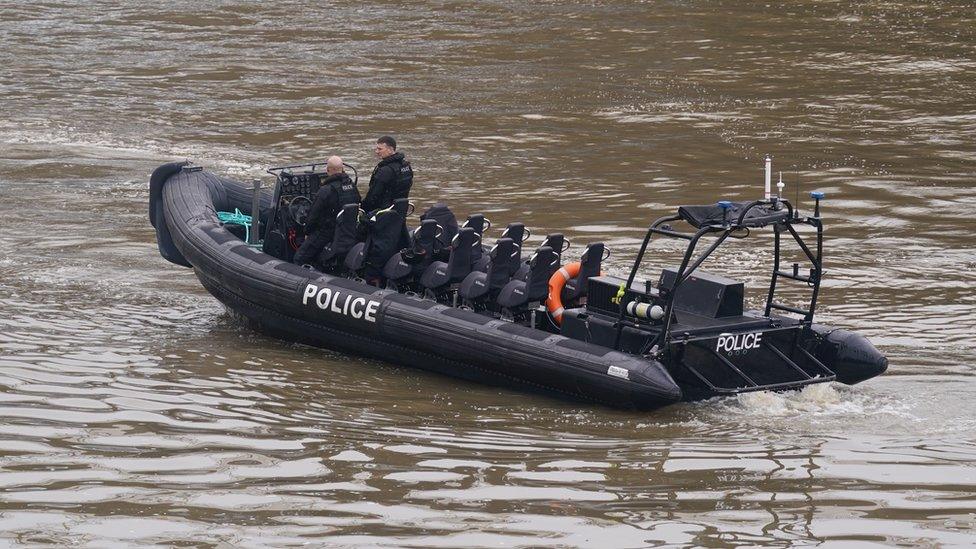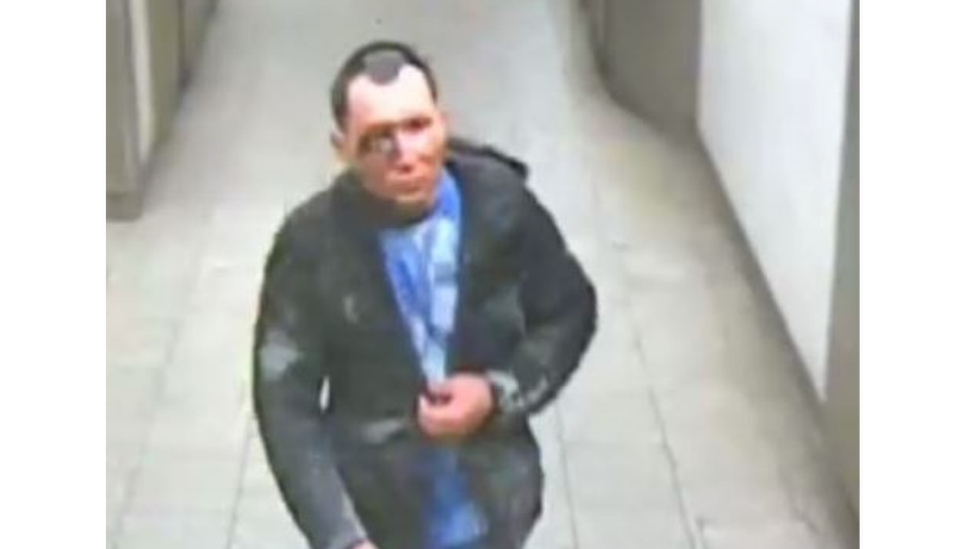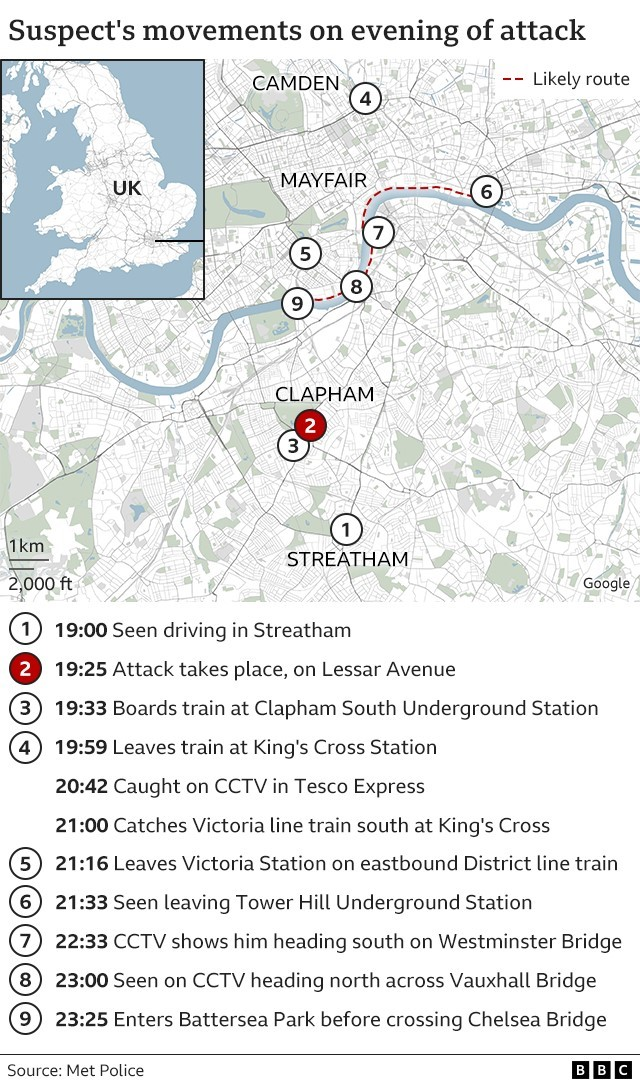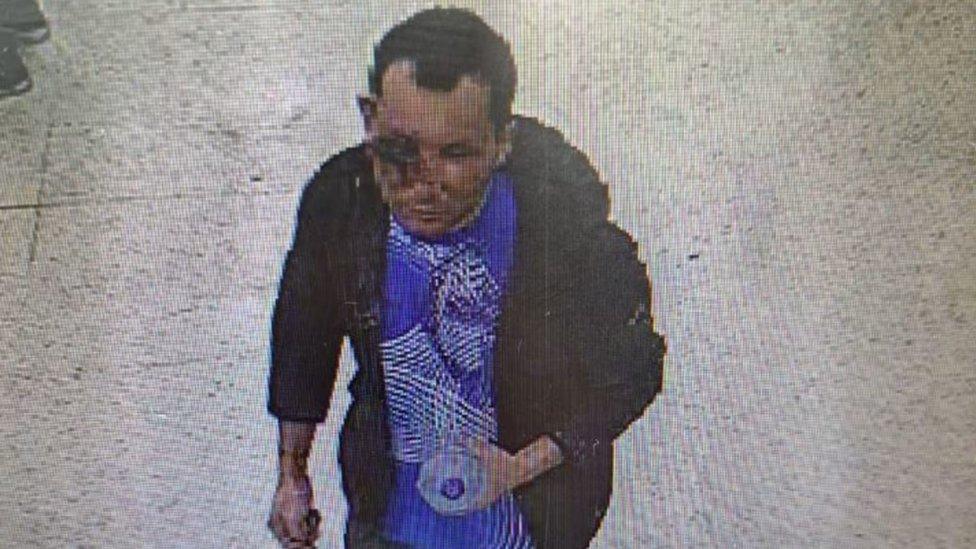Abdul Ezedi: Thames search for Clapham attack suspect
- Published

Officers began searching the river at low tide on Saturday morning
Police are searching the River Thames for the body of Abdul Shokoor Ezedi, the Clapham chemical attack suspect.
Detectives believe the 35-year-old may be dead after going into the water near Chelsea Bridge in west London on 31 January - hours after the attack.
CCTV footage showed him pacing and leaning over the bridge before he disappeared from view, police said.
Ezedi is accused of dousing a woman he once had a relationship with, and her daughters, with a corrosive substance.
The Metropolitan Police said on Saturday morning that police boat searches had commenced at low tide, from around 09:00 GMT, and were taking place near Chelsea Bridge and the surrounding stretch of river.
A few hours into the operation it was confirmed that the bodies of two men had been recovered within an hour of each other - one near HMS Belfast, in the Tower Bridge area, and the other in Limehouse, east London.
But police said neither of these were thought to be linked to the Ezedi investigation. Officers are working to confirm their identities, the Met added.
Ezedi was last seen on the bridge at 23:27, around four hours after the attack, and was not sighted leaving the area.
At a briefing on Friday, Met officers said the search of the Thames would involve boats from the Marine Policing Unit.
They warned that at this time of year the Thames was very fast flowing and full of snags, and that it was possible Ezedi's body may never surface.
Speaking at Scotland Yard, Cmdr Jon Savell said officers had spent the last 24 hours "meticulously" following CCTV and their "main working hypothesis" was that Ezedi had gone into the water.
"We have looked at all of the available cameras and angles, and with the assistance of Transport for London and CCTV from buses that were travelling over the bridge at the relevant time, and there is no sighting of him coming off the bridge," he said.
Cmdr Savell said there would be searches of the Thames, but it may take "some time ... for a person to surface and sadly, they may never actually be found".
He added that police were in contact with a member of Ezedi's family to "break that news".
Det Supt Rick Sewart, also at the briefing, said death was the "most probable outcome" if Ezedi had gone into the water.
Police have not outlined how the search will be conducted, but a former senior counter terrorism officer with the Met told the BBC officers would likely use technology such as sonar to search the river.
Nick Aldworth said marine police had an "intimate" understanding of the Thames.
"They know how the tides come in and out, how the eddies flow around the river - and they have a really good understanding of where a body may appear if it goes in at any particular point along its length," he told Radio 4's Today programme.

Ezedi suffered serious facial injuries in the attack he is suspected to have launched
The river theory came days after police said they believed Ezedi was "being helped by others" to evade capture, and that their inquiries were targeting "more of Ezedi's associates" following the arrest of one man on suspicion of assisting an offender. He was later bailed.
Searches have been ongoing for more than a week, with police raids carried out in the Newcastle area at properties linked to Ezedi on Thursday.
Originally from Afghanistan, Ezedi is believed to have arrived in the UK by lorry in 2016 - the same year he made his first unsuccessful asylum application. He settled in north-east England and is thought to have been living in Newcastle at the time of the attack.
He is wanted on suspicion of attempted murder over the attack, which took place in Lesser Avenue at about 19:25 GMT.
Watch: Police have released CCTV of Ezedi on Chelsea Bridge
The injured woman remains sedated in hospital and there are concerns she may lose sight in one eye. She and Ezedi had been in a relationship that broke down, police have said, and they arranged to meet before the attack took place.
Both her children, aged eight and three, have been discharged from hospital.
The suspect, who is not the father of the children, suffered serious facial injuries in the attack. Police have repeatedly encouraged him to seek medical attention.
He had his asylum claim rejected twice before he successfully appealed against the Home Office by claiming he had converted to Christianity.
Ezedi was convicted of two sexual offences in 2018 but was allowed to remain in the UK because his crimes did not meet the threshold for deportation.

Related topics
- Published2 February 2024
